Unlocking the Power of Data for Successful Events Event marketing has become a potent strategy, driving audience engagement and brand awareness. Event marketing statistics play a crucial role in data-driven decision-making, optimizing strategies, and enhancing attendee experiences. In this article, we explore the historical significance of event marketing, its advantages, and drawbacks. Moreover, we present 50 unique stats that illuminate the impact of events in the ever-changing marketing landscape.
Event marketing dates back to ancient times, evolving into a powerful modern promotional technique. Digital age advancements brought event marketing statistics into prominence, providing valuable insights to refine strategies and achieve maximum ROI.
Event marketing statistics offer real-time feedback and quantifiable results, enabling businesses to measure engagement and identify areas for improvement. Face-to-face interactions build stronger audience connections and brand loyalty. However, events can be resource-intensive and may not always yield immediate returns, while accurately tracking their impact poses challenges, necessitating a balance between qualitative and quantitative evaluation.
This article presents 50 curated stats on event marketing, covering attendee demographics, social media impact, lead generation, conversion rates, and post-event follow-ups. These unique statistics offer insights into the impact of events on business outcomes, empowering marketers with actionable strategies to elevate their event marketing endeavors.
Editor’s Choice
- 75% of Events in May 2023 Scheduled for In-Person Participation
- 22% of Event Professionals Pivoting to Hybrid Events in 2023
- 78% of In-Person Attendees Prefer Networking Face-to-Face
- 50% Organizers Find Moderating Q&A in Hybrid Events Challenging
- 71% of Event Marketers Understand Hybrid Events
- Safety and Security a Priority for 67% of Event Organizers
- 80% of Virtual Event Registrations are Complimentary
- Burnout Concerns High Among Event Professionals
- Event Apps Garner Over 80% Adoption Rate, Say 40% of Developers
- Event Teams Anticipate Potential Decrease in ROI for 2023
50 Unique Event Marketing Statistics of 2023
1. 55% of Event Professionals Opt for In-Person Experiences
Event professionals are embracing in-person experiences, with 55% planning to make most of their events physical. This shift reflects a growing desire for face-to-face interactions and networking opportunities, offering attendees a more immersive and engaging experience.
2. 75% of Events in May 2023 Scheduled for In-Person Participation
As the world moves towards a post-pandemic era, 75% of events scheduled for May 2023 are set to be in-person. This surge in physical gatherings indicates a collective readiness to reconnect, foster collaboration, and revive the vibrancy of the events industry.
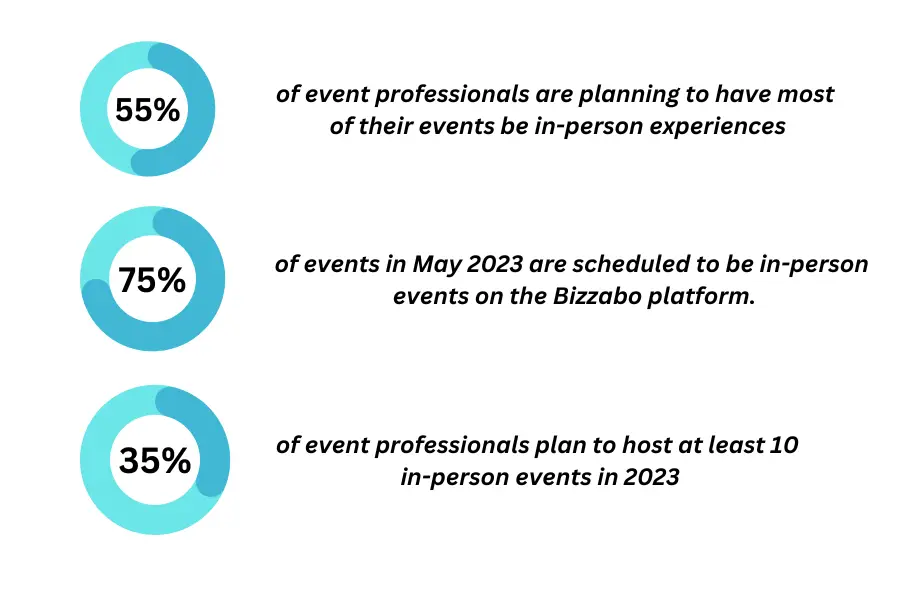
3. 35% Event Professionals to Host 10+ In-Person Events in 2023
Event professionals are optimistic about the return of live gatherings, as 35% of them plan to organize at least 10 in-person events in 2023. This rise in confidence showcases a strong belief in the efficacy of face-to-face events for achieving business objectives.
4. 72% of Event Organizers Acknowledge the Vital Role of In-Person Events
In-person events remain an indispensable part of the marketing strategy for 72% of event organizers. The profound impact of face-to-face interactions on building relationships, fostering brand loyalty, and driving business success has solidified the importance of physical gatherings.
5. Average In-Person Event Costs 47.8% More than Virtual Counterparts
While in-person events offer unparalleled benefits, it’s crucial to consider their cost implications. On average, organizing physical events incurs 47.8% higher expenses compared to virtual ones. This calls for a strategic approach to balance ROI and audience engagement.
6. 95% of Marketers Believe In-Person Events Drive Business Goals
The impact of in-person events on achieving business goals is well-recognized, with 95% of marketers attesting to their effectiveness. Face-to-face interactions facilitate lead generation, customer acquisition, and brand exposure, cementing the significance of live experiences in the marketing mix.
7. 9% Event Professionals Foresee the Majority of 2023 Events Going Virtual
While in-person events are making a strong comeback, 9% of event professionals still anticipate the majority of their events in 2023 to remain virtual. The hybrid approach is likely to persist, catering to diverse audience preferences and global accessibility.
8. 50% Events in January 2023 Embrace Virtual Format
Virtual events are maintaining their relevance in the new normal, with 50% of events in January 2023 adopting an online format. This trend highlights the continued appeal of virtual gatherings for their convenience and inclusivity.
9. 22% of Event Professionals Pivoting to Hybrid Events in 2023
The hybrid event model is gaining traction, as 22% of event professionals plan to incorporate it into the majority of their events in 2023. By blending in-person and virtual elements, this approach offers a flexible and inclusive event experience.
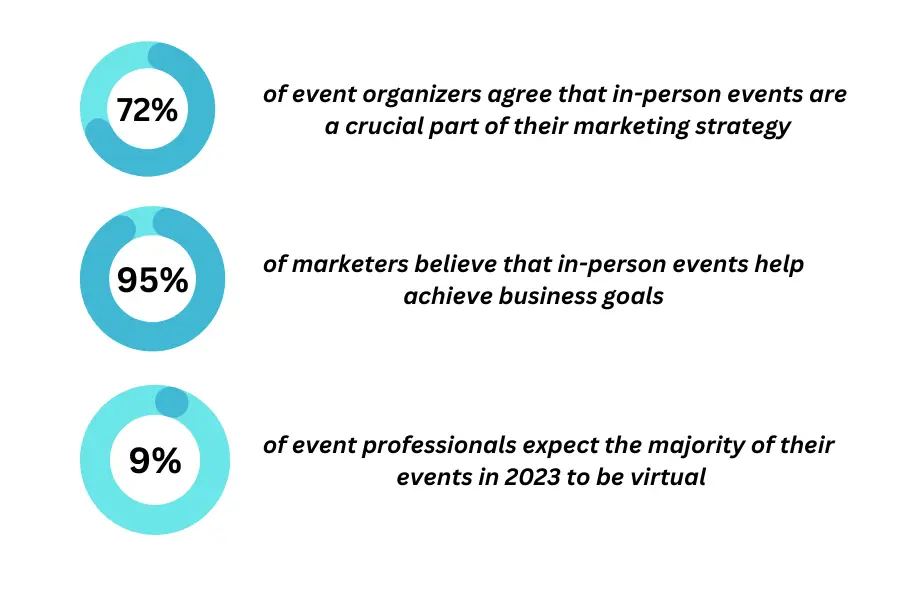
10. 67% of Event Organizers Expect In-Person Meetings to Rebound by 2022
Event organizers remain optimistic about the revival of in-person meetings, with 67% believing that they will return to pre-pandemic levels within one to two years. This confidence reflects the industry’s resilience and adaptability amidst changing circumstances.
11. 80% Event Pros Measure Success Based on Attendee Engagement
According to a study by Bizzabo in 2020, a significant 80% of event professionals evaluate the success of their events by gauging attendee engagement and satisfaction levels. This emphasizes the crucial role attendees play in determining the overall impact and effectiveness of an event.
12. 73% of Event Pros Eager to Return to In-Person Events
Bizzabo’s 2022 report reveals that 73% of event professionals are “very ready” or “ready” to embrace in-person events once again. After prolonged virtual experiences, the industry’s readiness to return to face-to-face interactions reflects the value of in-person connections in the events landscape.
13. 68.8% of Marketers Struggle with Networking in Virtual Events
In Bizzabo’s 2020 findings, 68.8% of event marketers express the challenge of providing networking opportunities in virtual events. The absence of physical presence and networking spaces makes fostering meaningful connections among attendees a complex task in virtual settings.
14. 78% of In-Person Attendees Prefer Networking Face-to-Face
As per Bizzabo’s study in 2021, an overwhelming 78% of in-person event attendees show a clear preference for networking with fellow attendees face-to-face. This statistic underscores the enduring value of personal interactions and relationship-building in the events industry.
15. 68.7% of Marketers Acknowledge Tech’s Role in Improving Attendee Experience
A survey by Knowland in 2022 found that 68.7% of event marketers recognize the long-term impact of leveraging technology to enhance attendee experiences. Integrating innovative tech solutions is becoming a persistent trend that enhances engagement and overall event success.
16. 46% of Organizers Struggle with Networking in Hybrid Events
Bizzabo’s 2022 report highlights that 46% of event organizers faced challenges in providing networking opportunities during hybrid events. Balancing interactions between virtual and in-person attendees poses unique logistical hurdles for organizers in the hybrid format.
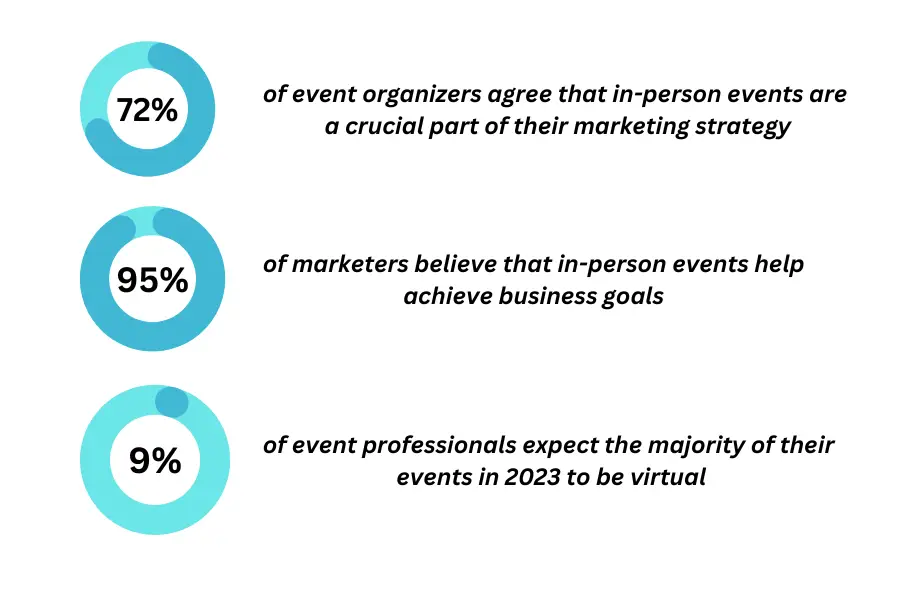
17. 71% Decision-Makers Find Virtual Events Challenging to Mimic In-Person Experience
According to a joint study by BlueJeans and Forrester in 2021, 71% of event decision-makers found it difficult to accurately replicate the in-person experience in virtual events. This showcases the complexities of recreating the immersive atmosphere of physical gatherings through digital means.
18. 59.4% Marketers Seek Hybrid Software Solutions for In-Person and Virtual Events
Bizzabo’s 2020 research reveals that 59.4% of event marketers are actively searching for hybrid software solutions to efficiently manage both in-person and virtual events. Such integrated tools streamline operations and improve the overall event management process.
19. 73.6% of Event Planners Enhanced their Tech Skills During the Pandemic
The pandemic prompted 73.6% of event planners to upskill in technology, as reported by EventMB in 2020. Adapting to virtual formats necessitated mastering digital tools, showcasing the industry’s resilience in the face of unprecedented challenges.
20. 50% Organizers Find Moderating Q&A in Hybrid Events Challenging
Bizzabo’s 2022 data indicates that 50% of organizers encountered difficulties moderating Q&A sessions with both virtual and in-person audiences in hybrid events. Juggling between the two formats while ensuring smooth communication demands careful planning and execution.
21. 75% Prefer On-Demand Sessions in Virtual Events
Participants in virtual events are increasingly valuing access to on-demand sessions, with a significant 75% indicating its importance. This trend, highlighted by Forrester’s 2021 study, reflects the growing desire for flexible and convenient content consumption among event attendees, shaping the future of event marketing strategies.
22. 50.6% Prioritize Virtual and In-Person Connectivity Tools
As event strategies evolve, 50.6% of respondents foresee the significance of tools that facilitate interactions between sponsors and attendees in both virtual and in-person settings. Bizzabo’s 2020 findings indicate a shift towards integrated networking solutions, fostering meaningful connections and engagement in events throughout 2023.
23. Burnout Worries 20% of Event Professionals
Event professionals are becoming increasingly concerned about burnout, with 20% expressing it as their top worry. The pressure of planning and executing events, as highlighted by Bizzabo’s 2023 data, emphasizes the importance of well-being initiatives and work-life balance within the industry.
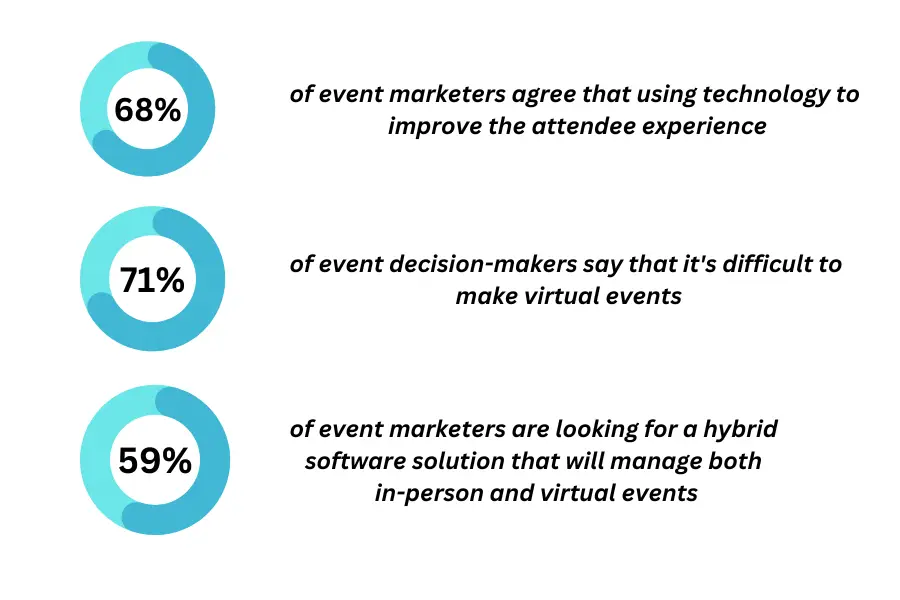
24. 57% Successfully Socialize during Hybrid Events
Hybrid events have emerged as a successful format for fostering social interactions, with 57% of in-person attendees reporting positive experiences. Bizzabo’s 2021 study demonstrates that the integration of virtual and in-person elements can enhance networking opportunities and attendee satisfaction.
25. 71% of Event Marketers Understand Hybrid Events
A significant 71% of event marketers possess a clear understanding of what constitutes a hybrid event. This insight, revealed by Bizzabo in 2020, indicates a growing awareness of the hybrid format’s benefits and versatility in reaching wider audiences with diverse preferences.
26. 75% Expect Similar or Increased In-Person Events in 2023
Despite the challenges faced, a notable 75% of event organizers anticipate hosting the same level or more in-person events in 2023. Knowland’s 2022 study reflects the industry’s optimism and resilience in returning to in-person gatherings and reinforcing the value of face-to-face interactions.
27. 72% Predict Stable or Growing B2B Marketing Budgets
According to Event Marketer’s 2020 survey, a substantial 72% of respondents foresee their B2B marketing budgets remaining steady or increasing. This data illustrates the enduring importance of events as a vital component of B2B marketing strategies, even amid evolving digital landscapes.
28. 46.3% Face the Challenge of Rising Event Costs
A significant challenge for 46.3% of event professionals is the increasing cost of organizing events. Knowland’s 2022 findings highlight the importance of budget management and resource optimization to ensure the continued success of events.
29. 80% Confident in Uninterrupted Event Schedules for 2023
An overwhelming 80% of event organizers believe that scheduled meetings and events for 2023 will proceed as planned without postponement. Knowland’s 2022 data reflects growing confidence in the industry’s recovery and ability to overcome uncertainties.
30. 78% Embrace More Technology post-Pandemic
The pandemic has driven a tech revolution in event planning, with 78% of event planners adopting more technology in their processes. Skift Meetings’ 2022 study highlights the enduring impact of digital transformation, driving efficiency and innovation within the events industry.
31. 35% of Virtual and Hybrid Events Rely on Full-Service Agencies
Over a third of virtual and hybrid events opt for the expertise of full-service agencies to ensure seamless execution and enhanced attendee experiences. This highlights the growing demand for professional support in planning and managing such events effectively.
32. Safety and Security a Priority for 67% of Event Organizers
Two-thirds of event organizers have explicit safety and security language in their meetings and events policy. This emphasizes the importance of providing a secure environment for attendees, which has become a crucial aspect in the post-pandemic landscape.
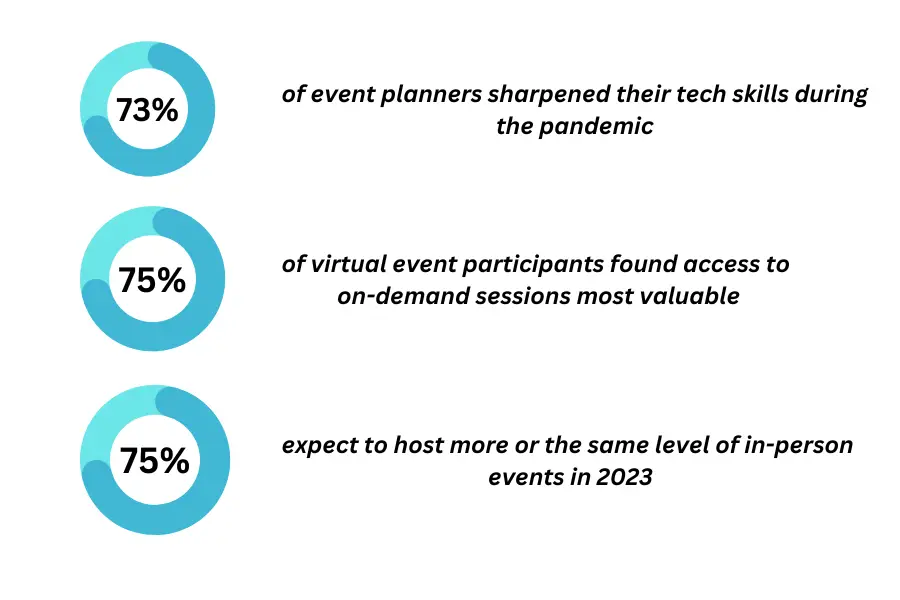
33. 67% of Event Organizers Plan for In-Person Events in 2023
Despite the rise of virtual experiences, two-thirds of event organizers are gearing up to host at least one in-person event in 2023. This indicates a positive shift towards a hybrid approach, balancing the benefits of both virtual and physical gatherings.
34. 71% of Event Decision-Makers Struggle with Brand Narrative in Virtual Events
A significant 71% of event decision-makers find it challenging to convey a compelling brand narrative during virtual events. This underscores the need for innovative strategies to engage audiences and maintain brand identity in the virtual landscape.
35. 80% of Virtual Event Registrations are Complimentary
A whopping 80% of virtual event registrations come with no cost, making them accessible to a broader audience. This free access contributes to higher attendance rates and allows event organizers to reach a wider demographic.
36. Engaging Virtual Attendees Proves Difficult for 68.7% of Event Marketers
Nearly 70% of event marketers face challenges in keeping virtual attendees engaged during event sessions. This calls for creative and interactive approaches to ensure virtual participants remain actively involved throughout the event.
37. 50% of Organizers Struggle with Q&A Moderation in Hybrid Events
Half of the event organizers find moderating Q&A sessions with both virtual and in-person audiences challenging in hybrid events. Balancing the two audience types requires thoughtful planning and technological solutions for smooth interaction.
38. 71% of Event Marketers Confident in Understanding Hybrid Events
A significant 71% of event marketers express confidence in their understanding of hybrid events. This reveals a growing awareness of the hybrid model and its potential benefits for future event planning.
39. Event Apps Garner Over 80% Adoption Rate, Say 40% of Developers
According to 40% of developers, event apps boast an impressive adoption rate of over 80%. These apps have become an integral part of event experiences, enhancing engagement and providing valuable resources for attendees.
40. 63% of Virtual Attendees Struggle to Socialize in Hybrid Events
Nearly two-thirds of virtual attendees find it challenging to socialize during hybrid events. Fostering connections between virtual and in-person participants remains a crucial aspect for organizers to address in hybrid gatherings.
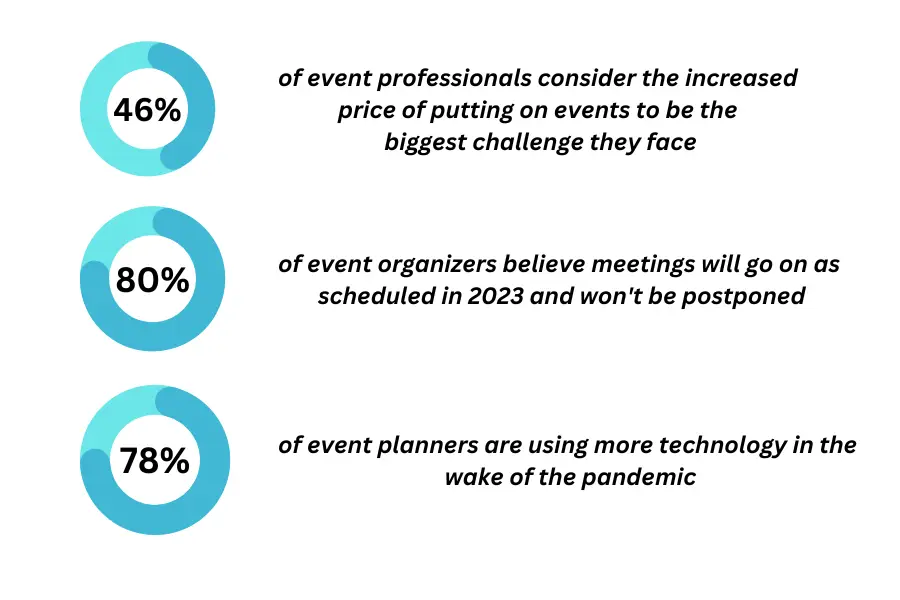
41. Burnout Concerns High Among Event Professionals
A significant 20% of event professionals express their foremost concern as burnout, according to a study by Bizzabo. The demanding nature of event planning and execution can take a toll on organizers, making it essential to implement strategies for managing stress and maintaining well-being.
42. Polls Facilitate Audience Connection in Hybrid Events
In the realm of hybrid events, 67% of speakers found polls to be an effective way to engage and connect with their audiences, as per research by Bizzabo. Real-time polling fosters interaction and enables event organizers to gather valuable insights and feedback from attendees.
43. The Challenge of Finding the Right Venue for Hybrid Events
35% of event organizers express that one of the major challenges in hosting a successful hybrid event is finding the appropriate venue, as reported by Markletic. Striking a balance between physical and virtual spaces is crucial to provide a seamless experience for both in-person and remote attendees.
44. Articulating Brand Narrative in Virtual Events Proves Difficult
According to a joint study by BlueJeans and Forrester, 68% of event decision-makers face difficulty in effectively conveying their brand narrative through virtual events. The absence of face-to-face interactions and limited engagement tools can hinder the immersive storytelling required for brand building.
45. Event Planners Predict Rising Costs for 2023
A staggering 73% of event planners anticipate a significant increase of 20 to 50% in event costs during 2023, as reported by Knowland. These rising expenses pose challenges for maintaining a favorable return on investment (ROI) and may require careful budgeting and resource allocation.
46. Confidence Prevails: 80% of Event Organizers Expect Timely Events in 2023
Despite challenges, 80% of event organizers believe that meetings and events will proceed as scheduled in 2023 without postponements, according to a study by Knowland. This optimism reflects the industry’s resilience and adaptability in the face of uncertainties.
47. Engaging Attendees Poses a Challenge in Virtual Event Sessions
An overwhelming 67.7% of event marketers find it more challenging to maintain attendee engagement during virtual event sessions, based on data from Bizzabo. The virtual environment requires innovative approaches to captivate participants and deliver valuable content effectively.
48. Event Teams Anticipate Potential Decrease in ROI for 2023
Looking ahead, 24.3% of event teams expect a potential decrease in return on investment (ROI) for 2023, as per a study by Knowland. This underscores the need for strategic planning and thoughtful execution to maximize event success and financial outcomes.
49. Nearly Half of the Event Pros Track Diversity and Equity Goals
According to a report by SHRM, 47% of event professionals actively track diversity and equity goals at least twice per year. This indicates a growing focus on fostering inclusive and representative events that cater to diverse audiences.
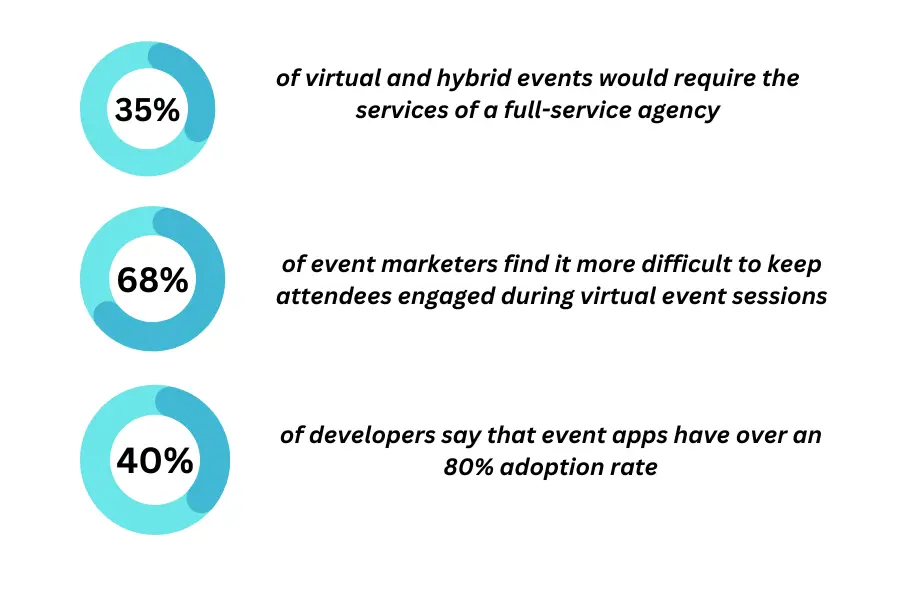
50. A Small Fraction of Event Professionals Foresee Negative ROI
While the majority remains optimistic, 7.9% of event professionals express concerns about generating a negative return on investment (ROI) for their events, as reported by Knowland. This highlights the importance of risk assessment and contingency planning to mitigate potential losses.
Conclusion:
In conclusion, event marketing statistics have emerged as a vital tool for businesses to thrive in the competitive marketing landscape. By delving into historical roots and understanding the advantages and disadvantages, marketers can harness the true potential of events to achieve their objectives.
Armed with the 50 unique stats presented in this article, businesses can make informed decisions, optimize event strategies, and create unforgettable experiences that leave a lasting impact on their audience.
As the marketing landscape continues to evolve, leveraging event marketing statistics will remain a key driver of success, allowing brands to stay relevant, engaging, and ahead of the curve in the ever-changing world of marketing.
